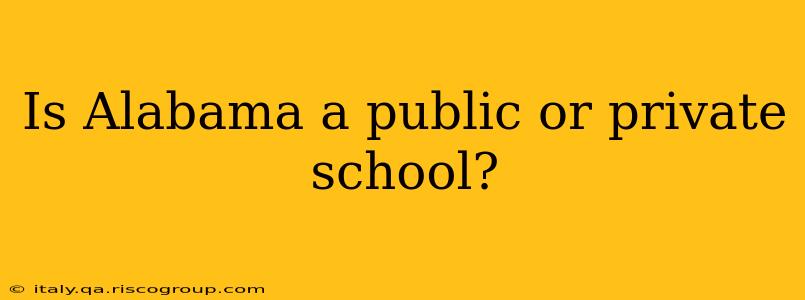Alabama's Public and Private School System: A Comprehensive Overview
Alabama's education system is a blend of public and private schools, each with its own structure, funding, and governance. Understanding the differences is crucial for parents, educators, and anyone interested in the state's educational landscape. This article will delve into the specifics of both public and private schools in Alabama.
Public Schools in Alabama: A State-Funded System
The vast majority of schools in Alabama are public schools. These are funded primarily by state and local taxes, making them accessible to all students regardless of socioeconomic background. The Alabama State Department of Education oversees the public school system, setting curriculum standards, allocating resources, and ensuring accountability.
Key Features of Alabama's Public Schools:
- State-Funded: Primarily financed through state and local taxes.
- Open Enrollment: Generally open to all students residing within a specific district.
- Standardized Curriculum: Follows a state-mandated curriculum.
- Public Accountability: Subject to state performance evaluations and assessments.
- Diverse Student Population: Represents a broad range of socioeconomic backgrounds and academic abilities.
Private Schools in Alabama: A Diverse Landscape
Private schools in Alabama operate independently of the state's public school system. They are funded through tuition fees, donations, and endowments, and they are not bound by the same regulations and standards as public schools. This leads to a diverse range of educational philosophies and approaches.
Characteristics of Private Schools in Alabama:
- Tuition-Based: Require parents to pay tuition fees to enroll their children.
- Independent Governance: Set their own curricula, admissions policies, and disciplinary procedures.
- Religious Affiliation: Many private schools are affiliated with religious organizations, reflecting their specific values and beliefs.
- Specialized Programs: Some private schools offer specialized programs, such as arts, athletics, or advanced academics, that may not be available in public schools.
- Smaller Class Sizes: Often have smaller class sizes than public schools.
Choosing Between Public and Private Schools in Alabama: Key Considerations
The decision of whether to enroll a child in a public or private school is a deeply personal one, based on individual family needs and values. Here are some factors to consider:
- Cost: Private schools are significantly more expensive than public schools.
- Curriculum: Public schools follow a state-mandated curriculum, while private schools have more flexibility.
- Religious Affiliation: Families seeking a faith-based education may prefer a private religious school.
- Class Size: Private schools often have smaller class sizes.
- Specialized Programs: Some private schools offer specialized programs not found in public schools.
- Location and Accessibility: Consider proximity to home and transportation options.
Conclusion: A Spectrum of Educational Opportunities
Alabama offers a diverse range of educational opportunities, encompassing both robust public schools and a variety of private schools catering to different needs and preferences. Thoroughly researching options and carefully considering individual needs are crucial to selecting the best educational path for each child. Parents are encouraged to visit schools, talk to administrators and teachers, and review student performance data before making a decision. Remember, the best school for one child may not be the best for another.

